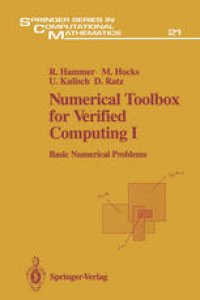
Ebook: Numerical Toolbox for Verified Computing I: Basic Numerical Problems Theory, Algorithms, and Pascal-XSC Programs
Author: Prof.Dr. Ulrich Kulisch Dr. Rolf Hammer Dr. Dietmar Ratz Dipl-Math. oec. Matthias Hocks (auth.)
- Tags: Numerical Analysis, Programming Techniques
- Series: Springer Series in Computational Mathematics 21
- Year: 1993
- Publisher: Springer-Verlag Berlin Heidelberg
- Edition: 1
- Language: English
- pdf
As suggested by the title of this book Numerical Toolbox for Verified Computing, we present an extensive set of sophisticated tools to solve basic numerical problems with a verification of the results. We use the features of the scientific computer language PASCAL-XSC to offer modules that can be combined by the reader to his/her individual needs. Our overriding concern is reliability - the automatic verification of the result a computer returns for a given problem. All algorithms we present are influenced by this central concern. We must point out that there is no relationship between our methods of numerical result verification and the methods of program verification to prove the correctness of an imple~entation for a given algorithm. This book is the first to offer a general discussion on • arithmetic and computational reliability, • analytical mathematics and verification techniques, • algorithms, and • (most importantly) actual implementations in the form of working computer routines. Our task has been to find the right balance among these ingredients for each topic. For some topics, we have placed a little more emphasis on the algorithms. For other topics, where the mathematical prerequisites are universally held, we have tended towards more in-depth discussion of the nature of the computational algorithms, or towards practical questions of implementation. For all topics, we present exam ples, exercises, and numerical results demonstrating the application of the routines presented.
This book presents an extensive set of sophisticated tools to solve numerical problems with a verification of the results using the features of the scientific computer language PASCAL-XSC. The overriding concern of this book is reliability - the automatic verification of the result a computer returns for a given problem. This book is the first to offer a general discussion on arithmetic and computational reliability, analytical mathematics and verification techniques, algorithms, and (most importantly) actual implementations in the form of working computer routines. In each chapter, examples, exercises, and numerical results demonstrate the application of the routines presented. It is not assumed that the reader has any prior formal knowledge of numerical verification or any familiarity with interval analysis. Some of the subjects that the book covers in detail are not usually found in standard numerical analysis texts. This book is intended primarily as a reference text, however, it can also be used as a textbook for an advanced course in scientific computation with automatic result verification.
This book presents an extensive set of sophisticated tools to solve numerical problems with a verification of the results using the features of the scientific computer language PASCAL-XSC. The overriding concern of this book is reliability - the automatic verification of the result a computer returns for a given problem. This book is the first to offer a general discussion on arithmetic and computational reliability, analytical mathematics and verification techniques, algorithms, and (most importantly) actual implementations in the form of working computer routines. In each chapter, examples, exercises, and numerical results demonstrate the application of the routines presented. It is not assumed that the reader has any prior formal knowledge of numerical verification or any familiarity with interval analysis. Some of the subjects that the book covers in detail are not usually found in standard numerical analysis texts. This book is intended primarily as a reference text, however, it can also be used as a textbook for an advanced course in scientific computation with automatic result verification.
Content:
Front Matter....Pages i-xv
Introduction....Pages 1-14
Front Matter....Pages 15-15
The Features of PASCAL-XSC....Pages 17-30
Mathematical Preliminaries....Pages 31-53
Front Matter....Pages 55-55
Evaluation of Polynomials....Pages 57-68
Automatic Differentiation....Pages 69-86
Nonlinear Equations in One Variable....Pages 87-104
Global Optimization....Pages 105-130
Evaluation of Arithmetic Expressions....Pages 131-151
Zeros of Complex Polynomials....Pages 152-172
Front Matter....Pages 173-173
Linear Systems of Equations....Pages 175-194
Linear Optimization....Pages 195-224
Automatic Differentiation for Gradients, Jacobians, and Hessians....Pages 225-263
Nonlinear Systems of Equations....Pages 264-281
Global Optimization....Pages 282-311
Back Matter....Pages 313-339
This book presents an extensive set of sophisticated tools to solve numerical problems with a verification of the results using the features of the scientific computer language PASCAL-XSC. The overriding concern of this book is reliability - the automatic verification of the result a computer returns for a given problem. This book is the first to offer a general discussion on arithmetic and computational reliability, analytical mathematics and verification techniques, algorithms, and (most importantly) actual implementations in the form of working computer routines. In each chapter, examples, exercises, and numerical results demonstrate the application of the routines presented. It is not assumed that the reader has any prior formal knowledge of numerical verification or any familiarity with interval analysis. Some of the subjects that the book covers in detail are not usually found in standard numerical analysis texts. This book is intended primarily as a reference text, however, it can also be used as a textbook for an advanced course in scientific computation with automatic result verification.
Content:
Front Matter....Pages i-xv
Introduction....Pages 1-14
Front Matter....Pages 15-15
The Features of PASCAL-XSC....Pages 17-30
Mathematical Preliminaries....Pages 31-53
Front Matter....Pages 55-55
Evaluation of Polynomials....Pages 57-68
Automatic Differentiation....Pages 69-86
Nonlinear Equations in One Variable....Pages 87-104
Global Optimization....Pages 105-130
Evaluation of Arithmetic Expressions....Pages 131-151
Zeros of Complex Polynomials....Pages 152-172
Front Matter....Pages 173-173
Linear Systems of Equations....Pages 175-194
Linear Optimization....Pages 195-224
Automatic Differentiation for Gradients, Jacobians, and Hessians....Pages 225-263
Nonlinear Systems of Equations....Pages 264-281
Global Optimization....Pages 282-311
Back Matter....Pages 313-339
....